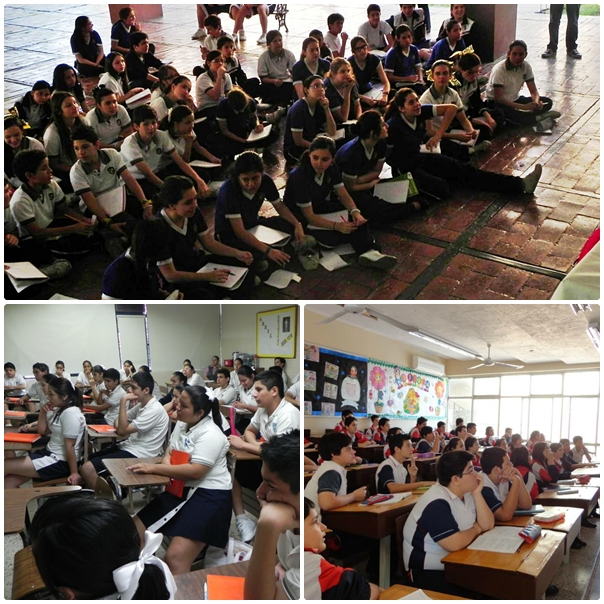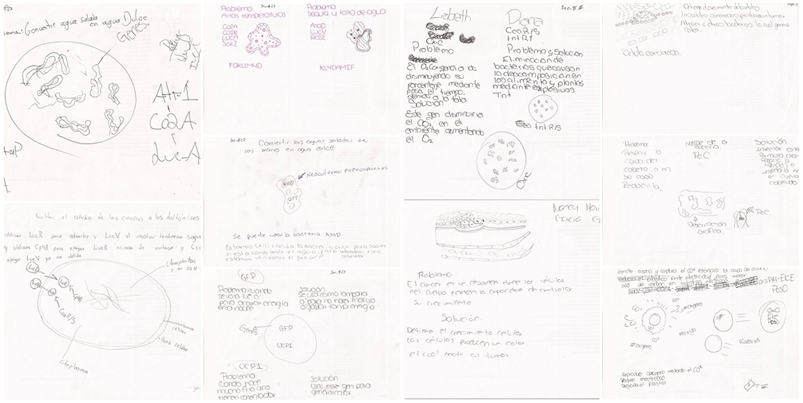Team:UANL Mty-Mexico/Jr Highshool1
From 2013.igem.org
Ivanmorales (Talk | contribs) |
|||
| (2 intermediate revisions not shown) | |||
| Line 4: | Line 4: | ||
<body> | <body> | ||
| - | <p><h3>Jr. High School Visits | + | <p><h3>Jr. High School Visits <a href="https://2013.igem.org/Team:UANL_Mty-Mexico/Talks"class="btn btn-info"><font color="#fff"> Back</font></a></h2></a></p> |
<p align="justify">One of the many ways to achieve a better diffusion of iGEM and Synthetic Biology is through students.</p> | <p align="justify">One of the many ways to achieve a better diffusion of iGEM and Synthetic Biology is through students.</p> | ||
| - | <p align="justify">Our objective is to convey these topics with an accessible discourse and to evaluate this through surveys, which will also allow us to assess the impact of our expositions and talks in public and private <a href="https://2013.igem.org/Team:UANL_Mty-Mexico/Jr_Highschools" target="_blank"><b>junior high schools</b></a> from the metro area of our city. | + | <p align="justify">Our objective is to convey these topics with an accessible discourse and to evaluate this through surveys, which will also allow us to assess the impact of our expositions and talks in public and private <a href="https://2013.igem.org/Team:UANL_Mty-Mexico/Jr_Highschools" target="_blank"><b>junior high schools</b></a> from the metro area of our city. We gave a presentation/talk that addressed students in a clear, simple and concise way; we also performed some experimental demonstration, like banana DNA extraction and the simulation of an iGEM competition, where students had to propose a fictitious iGEM project with the information that we taught them, in order to make them understand the topic more profoundly.</p><br> |
| - | + | ||
| - | + | ||
<div class="center" style="width:600px float:right"> | <div class="center" style="width:600px float:right"> | ||
| Line 84: | Line 82: | ||
</br><br> | </br><br> | ||
| - | <p align="justify">We also planned an integrative activity, where we asked the children to generate their own <a href="https://static.igem.org/mediawiki/ | + | <p align="justify">We also planned an integrative activity, where we asked the children to generate their own <a href="https://static.igem.org/mediawiki/2013/3/38/Igem_simulation.pdf" target="_blank"><b>Synthetic Biology projects</b></a>, based on some BioBricks, to show them how scientific projects start and that even the craziest ideas can come true.</p> |
</br> | </br> | ||
Latest revision as of 03:57, 29 October 2013
Jr. High School Visits Back
One of the many ways to achieve a better diffusion of iGEM and Synthetic Biology is through students.
Our objective is to convey these topics with an accessible discourse and to evaluate this through surveys, which will also allow us to assess the impact of our expositions and talks in public and private junior high schools from the metro area of our city. We gave a presentation/talk that addressed students in a clear, simple and concise way; we also performed some experimental demonstration, like banana DNA extraction and the simulation of an iGEM competition, where students had to propose a fictitious iGEM project with the information that we taught them, in order to make them understand the topic more profoundly.
The presentation was meant for approximately 50 min and consisted in a short introduction of basic concepts and examples of past iGEM projects.
Description Back to top
Objectives:
-Explain Junior High School students the importance of Synthetic Biology nowadays. -Record and measure the impact that the knowledge of this scientific area has among teenagers of our community.
Activities:
In order to fulfill our objetives, we realized the following activities:
1.Survey to assess the opinion of junior high students regarding Synthetic Biology before the presentation. 2.A short presentation about our team iGEM UANL_Mty-Mexico 2012. 3.Introduce Biotechnology, explaining its present meaning and importance. 4.Introduce Synthetic Biology, explaining its meaning and some elements that it comprises. 5.Explain some of the precautions we must take into account in Microbiology and the concept of Biological Risk. 6.Mention some of the past Synthetic Biology projects and their aplications. 7.Discussion about the social impact of Synthetic Biology. 8.Perform the extraction of the DNA from a banana.
Topics:
1.iGEM and genetically engineered machines 2.What is Biotechnology and what is it good for? 3.Synthetic Biology 4.How does Synthetic Biology work? 5.Precautions when working with Synthetic Biology 6.The Microbiology Lab 7.Applications of Synthetic Biology: examples of past projects 8.Purpose of Synthetic Biology
Among the experimental activities, we had a protocol for the extraction of DNA from a banana; materials were selected so that they could be easily found.
We also planned an integrative activity, where we asked the children to generate their own Synthetic Biology projects, based on some BioBricks, to show them how scientific projects start and that even the craziest ideas can come true.
Permission was asked to the proper authorities to give the presentation and activities in different junior high and also high schools.
Surveys
It is important for us to assess the impact of our activities on these students, so we surveyed them with easy questions before each presentation -in order to have a better idea of their perception on this matter- and after the activities –so we can measure the generated knowledge. Surveys Results
 "
"





